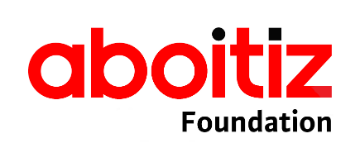
“After three decades of providing boundless opportunities to communities nationwide, we continue to transition into an integrated CSR strategy that encourages meaningful collaborations and resource sharing across the Aboitiz Group.”
What could be more compelling than seeing our value, not just as a business, but a reputable, reliable, and trustworthy partner in nation-building? Ultimately, this is the role we want to play in the lives of the community and cooperative members and scholars we assist. To achieve this, we see ourselves as the orchestrator of a dynamic and interdependent Aboitiz CSR ecosystem that advances business and communities.
As the driver of the Aboitiz Group’s CSR and a backbone organization playing a dual role of a corporate foundation that helps the business units operate without disruptions, and a development partner that cares and looks out for the needs of our host communities, we invest in building good communities that are safe, empowered, sustainable, and prosperous.
Our Strategy
CSR 2.0
To ensure that our projects deliver the much-needed results for our communities, we encourage the development of carefully-designed interventions that are inclusive, collaborative, and scalable.
From the traditional charitable projects or dole-outs, we have been transforming the way we do CSR by following the CSR 2.0 parameters towards inclusive impact.
Seven Parameters
To ensure that our projects deliver the much needed results for our communities, we encourage development of carefully-designed interventions that are inclusive, collaborative, and scalable. From the traditional charitable projects or dole-outs, we have been transforming the way we do CSR and following the CSR 2.0 parameters towards inclusive impact.
01
Addresses a community need
- Has the capacity to increase income levels and generate employment
- Uplift the living conditions of the beneficiaries.
02
Aligns with our core business
- Relates to the core businesses of our strategic business units (SBUs) – power, banking and financial services, food, infrastructure, and land.
03
Helps our business or creates competitive advantage for the Business Units (BUs)
- Helps increase revenues and lower costs
- Enhances key stakeholder relationships with local government unit, host community, etc.
- Creates brand advocates from among our beneficiaries
- Helps in unimpeded operation of the plant or company
- Promotes understanding and social acceptance of projects
04
Aligns with the Aboitiz Foundation’s programs
- Aligns with the foundation’s program of education, enterprise development, environment, including disaster risk reduction and resilience
05
Involves skills training and capability building
- Involves skills training and knowledge or attitude/character building of the beneficiaries
- Involves activities (lectures, fora, seminars) aimed at enhancing projects of the assisted groups, schools communities, and key stakeholders
- Involves training and capability building designed to help beneficiaries generate income or livelihood.
06
Encourages team member volunteerism and participation
- Team members volunteer to help complete the project
07
Nationwide in scope
- Projects are scalable and can be replicated and implemented across the group
Integrated CSR (iCSR) Strategy
As our strategies continue to evolve through integration, we also continuously improve our implementing structures. We see the critical role of collaboration and a sustainable approach towards advancing communities.
In 2019, we operationalized the iCSR Regional Councils in Luzon, Visayas, and Mindanao composed of CSR teams in the said locations. These councils regularly meet to discuss, plan, and manage integrated CSR projects that highlight the pooling of resources and sharing of expertise of various Aboitiz business units and partners.

The iCSR Luzon regional council is composed of three subgroups based on the business units’ locations: Northern, Central, and Southern Luzon. The series of dialogue and assessments of the regional council showed that compared to the rest of the regions, Luzon has the highest frequency of calamities per year. This led them to drive the ‘Collaboration Towards Disaster Resilience’, an integrated CSR program that aims to develop and scale up disaster-prone areas in the Luzon region through end-to-end sustainable development programs.
As part of the program, Community-Based Disaster Risk Reduction and Management training sessions were rolled out in various barangays in Itogon and Bakun, Benguet; Sto. Tomas, Batangas, and Hermosa, Batangas. These sessions and other initiatives of iCSR Luzon work towards helping the assisted communities develop and implement their disaster preparedness plans. To date, iCSR Luzon has trained 100 individuals and reached six barangays in their target areas.

The iCSR Visayas regional council is working on two CSR programs: Cebu A-Park and the School-Based Disaster Risk Reduction and Management Program (“SBDRRM”).
In partnership with the Philippine Business for Social Progress, the Cebu A-Park was established to rehabilitate the 150-hectare adopted area in the Buhisan Watershed. This is the focus of the five-year program that will reforest and enrich the upland area through tree planting, establish nursery and butterfly sanctuary, plantation area to name a few. Through Cebu A-Park, the partner-communities will also be trained on project management and Disaster Risk Reduction Management.
On the other hand, SBDRRM program has been conducted in 11 schools and trained 30 teachers in San Carlos City, Cebu. In partnership with the Municipal Disaster Risk Reduction and Management Office and the local government in San Carlos City, the teachers (Disaster Risk Reduction Coordinators) became aware of the possible risks in their respective schools’ locations. Moreover, the training identified the school’s requirements to fully implement the disaster resilience plans. These gaps are being addressed by the LGU.
Following the training sessions, the iCSR Visayas is continuously monitoring the assisted schools, organizing follow-through meetings and workshops, and coordinating with the concerned agencies to ensure that the plans are updated and executed.

The iCSR Mindanao is implementing the three-year Cacao Agribusiness project in Davao City. This is done in partnership with the Apo Farmers Multipurpose Cooperative (AFAMULCO), which is composed of Bagobo Klata Indigenous Peoples, and the Cacao Industry Development Association of Mindanao (CIDAMI).
The collaboration of twelve Aboitiz business units in Mindanao focuses on value-adding activities for AFAMULCO, which was found to produce raw cacao and supply wet beans to buyers at a very low price. Without the essential skills, resources to invest in processing facilities, and lack of entrepreneurial skills, its members continue to pursue challenging lives.
A set of organizational, leadership, and cacao-specific training sessions and business incubation activities help strengthen AFAMULCO and revitalize its cacao business. This enables the farmers to participate in other phases of the cacao value chain.
The Kakao Konek conference sponsored by CIDAMI provided an opportunity for the farmers to learn about the latest trends and income possibilities related to cacao farming. The cooperative strengthening activities included Strategic Planning, workshops on leadership, and values reorientation were facilitated by trainers from Davao Light. The business units also provided mentoring on growing its membership and shared capital, connected them to other networks that will help them expand their capacities.
The project also aims to preserve the IP culture through the design of culturally-sensitive activities, and the documentation and promotions of their culture for the community members and the young generation.
Priority Program Areas
To co-create safe, empowered, and sustainable communities, we continuously focus on the areas of education, enterprise development, and the environment.
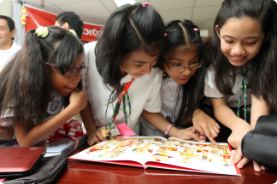
Education as an enabler for empowerment
Since the inception of the Aboitiz Foundation in 1988, we have been investing heavily in projects designed to provide access to quality education in the Philippines.
Working with various schools, training institutions, the Department of Education, and various organizations, we execute strategic and purposive education programs to ensure that we produce deserving graduates and guide them to become productive members of the workforce. Knowing that our initiatives help them become gainfully employed, start a business, or pursue further education fuels us to move forward in investing in projects that truly empower people.
To contribute to the United Nations Sustainable Development Goals for quality education, we provide quality technical, vocational, and tertiary education, and offer financial assistance and scholarships. We also continuously work with our partners to build and improve learning facilities, provide advanced training programs for our assisted teachers, and conduct in-school feeding programs.
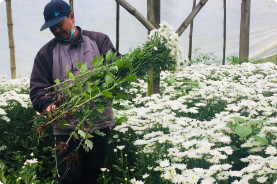
Enterprise Development towards shaping resilient enterprises
In 2019, our Enterprise Development approach focused on providing end-to-end and cost-efficient interventions for community-based enterprises. As part of our One Coop One Product (OCOP) strategy, our projects ensure that relevant support is provided from production to marketing, by orchestrating support from various actors. These include leveraging resources for the capacity building, infrastructure, financing, and market linkage needs of community enterprises. We also worked with our Environment team in rolling out Business Continuity Planning sessions that aim to manage the vulnerabilities of our partner cooperatives and promote enterprise sustainability.
Aligning with the United Nations SDG goal on decent work and economic growth, we also implement the Adopt-a-Branch and Wholesale Fund programs in partnership with the Center for Agriculture and Rural Technology, a microfinance institution, to cater to cooperatives and provide loans for their businesses.
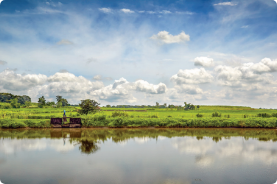
Advocating disaster preparedness and resilience
Our environment initiatives in the year 2019 focused on building the resilience of the communities as our teams trained 659 Filipinos from 47 barangays and 12 schools nationwide on disaster risk reduction and management. These community-based disaster risk reduction and management (CBDRRM) training-workshops help community members and disaster resilience coordinators identify local risks and hazards and develop their action plans to mitigate risks. This activity is done in partnership with the WeatherPhilippines Foundation (WPF) under its #WeatherWiser Nation campaign.
Part of our Environment program is our efforts on reforestation and environmental sustainability. As of 2019, we have planted 6.9 million trees out of the 9 million target by 2020, in partnership with the Ramon Aboitiz Foundation, Philippine Business for Social Progress, and Therma South, Inc.
We also maintain the Aboitiz Cleanergy Park, a turtle sanctuary where we welcomed 10,735 visitors and released 4,811 hatchlings in 2019. We are also nearing the completion of the Balabag Wetland Park in Boracay, a collaborative project with the Department of Environment and Natural Resources.
25 Good Communities by 2025 Campaign
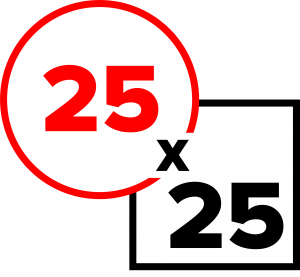
The 25×25 Campaign aims to orchestrate the Aboitiz CSR ecosystem, create synergies through integration, collaboration, and innovation; and enhance and build our reputation while mitigating risks.
It is a flagship activity that is designed to build communities or barangays with inter-generational change agents and model families, sharing our core values. The campaign targets to achieve the following attributes:
- 21st Century schools with creative, innovative, productive, and employable students
- Resilient, prosperous, and inclusive enterprises
- Safe and sustainable environment
- Empowered and responsible leaders
Our Milestones
We have always firmly believed that there is a strong connection that links business sustainability and community growth. We continuously face the challenge to scale up our CSR strategies by moving beyond doing good to ‘building good communities together’. Today, we have made significant progress in terms of advancing communities.
Our Achievements at a Glance
Number of CSR Projects
Number of Beneficiaries
Number of Cooperatives Assisted
Number of Scholars
Amount of Investment
